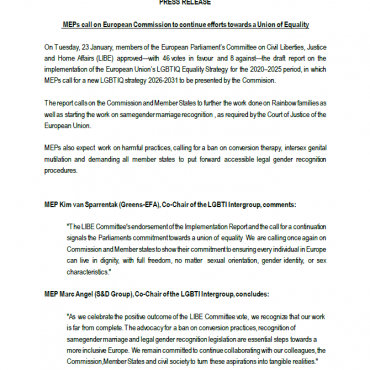European Parliament condemns crackdown on LGBTI rights in Turkey
In a resolution adopted today, the European Parliament raised its concerns on the worsening situation for human rights in Turkey, including the human rights of LGBTI people.
 The resolution calls on Turkish authorities to revoke the indefinite ban on events organised by LGBTI organisations, decided by the Ankara Governor’s Office on 19 November 2017. Following the Governor’s statement, other regions in Turkey have also banned LGBTI events (cf. consideration M & par. 12).
The resolution calls on Turkish authorities to revoke the indefinite ban on events organised by LGBTI organisations, decided by the Ankara Governor’s Office on 19 November 2017. Following the Governor’s statement, other regions in Turkey have also banned LGBTI events (cf. consideration M & par. 12).
These bans have taken place in a context of repeated restrictions on the rights of LGBTI people, such as the ban of Pride Marches around the country by Turkish authorities – including of Istanbul Pride in 2015, 2016 and 2017.
The European Parliament reminded that such bans are in gross violation of the right to freedom of expression and freedom of assembly, as guaranteed by Turkish law as well as international law.
Terry Reintke MEP, Co-President of the LGBTI Intergroup at the European Parliament said “LGBTI activists are increasingly silenced in Turkey, and this is worrying. LGBTI people have the right to freedom of expression and freedom of assembly, like everyone else, and this right must be restored”
Furthermore, the text mentions specifically the case of Ali Erol, LGBTI human rights defender, who was arrested on 2 February 2018 and on unspecified grounds, and released just yesterday.
The European Parliament also expressed its concern about Diren Coskun, a trans activist detained in a Turkish prison, who started a hunger strike on 25 January because she does not receive medical care (amendment 3).
Daniele Viotti MEP, Co-President of the LGBTI Intergroup at the European Parliament added: “The detention of human rights defenders, the multiple bans on Pride and LGBTI events and the detention of LGBTI activists are symptomatic of the country’s worsening human rights situation. All fundamental human rights must be protected and guaranteed in Turkey, including the human rights of LGBTI people”.
Read more:






